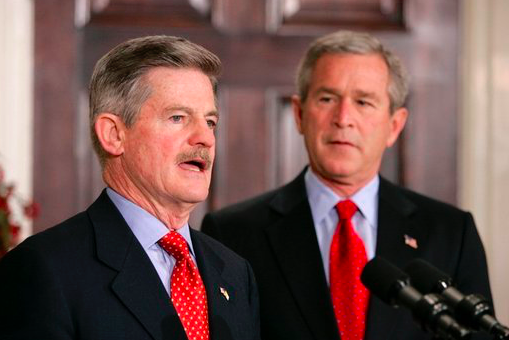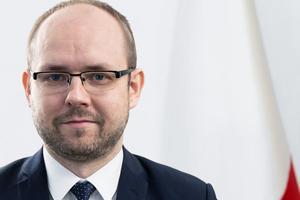Trump’s Catholic Coalition Could Have “Very Positive Effect” on Presidency
Former U.S. Ambassador to the Holy See, Jim Nicholson, says the President-elect has been a “very good listener” at meetings with a Catholic coalition of advisers.

President-elect Donald Trump has been a “very good listener” during meetings of a Catholic coalition group that he set up to advise him on the faith during his presidential campaign.
This is according to one of its members, former U.S. Ambassador to the Holy See, Jim Nicholson.
Nicholson told the Register Nov. 10 that the newly elected President is not only an “intent listener” who heeded their advice in the lead up to Tuesday’s ballot, but also “asks very good questions”. He therefore believes the group could have a “very positive effect on President-elect Trump”.

“I think we’ll have a good audience and a good chance to be heard and help shape his views about all things Catholic,” said Nicholson, who served as U.S. ambassador to the Holy See during President George W. Bush’s first term before being appointed Secretary of Veterans Affairs from 2005 to 2007.
Trump pledged to continue communication with its members if elected president.
Nicholson further pointed out that Trump “carries the Catholic vote which is a large number”, adding that he has “a lot of friends and associates who are Catholic — he grew up in New York City.”
Catholics were crucial to Trump's election: he won 52% of the Catholic vote, compared to Hillary Clinton's 45%.
In addition to Nicholson, the Catholic coalition group's members include former US Senator and presidential candidate Rick Santorum; Ambassador Francis Rooney, Nicholson’s immediate successor as U.S. Ambassador to the Holy See and now newly elected congressman in Florida; and Austin Ruse, president of the Center for Family and Human Rights and tireless defender of life at the United Nations.
Also in his comments to the Register, Nicholson spoke about his hopes for relations between Trump, the Holy See and Pope Francis, despite clear differences.
Here below is the full text of Secretary Nicholson’s remarks to the Register:
“Secretary Nicholson, what are your expectations regarding Trump’s relationship with the Holy See?
I think it will be a good relationship. I’m delighted with the Trump victory because it’s a victory for working class people, for underemployed people and unemployed people — people for whom the Pope has great concern. So they have a great amount in common in their priorities.
The Pope has often spoken of his concerns about capitalism. Could this be a problem going forward in relations with a Trump administration?
They have differences in views but a great deal in common. They have a mutual concern for poor, a mutual concern for the foundation of the Catholic Church which is life. Trump is adamantly pro-life, as is the Pope. I think on matters like their view of capitalism and the free market and of course immigration, we should acknowledge differences.
That is going to depend a lot on how effective the ambassador that Trump selects to represent him at the Holy See will be. If he gets a very good, articulate interlocutor to explain what he wants to do and what his thinking is to the Holy See and to the Holy Father, it will go along way, because the Pope respects the rule of law, he respects sovereignty. So that’s a very important issue in the immigration debate.
The Pope is also concerned for the humanitarian aspects of people, migrant people, so those are issues that need to be discussed openly, a common set of foundational values about the dignity of people, their welfare.
Trump and I agree with him on this – that the best thing you can do is help people get a job, help them get on their feet, and get back to dignity of having a purpose in life. That has got to be very consistent with the Pope’s values at a human level. How that’s done on an economic level, they might not agree, so that has to be dealt with. I think Trump has a healthy respect for the Pope, he recognizes his moral authority, and I think it could be a very enduring relationship.
Regarding the Catholic coalition of advisors, how much effect and influence could it have going forward?
It can have a very positive effect on President-elect Trump. He carries the Catholic vote, it’s a large number and he has a lot of friends and associates who are Catholic — he grew up in New York City. I think we’ll have a good audience and a good chance to be heard and help shape his views about all things Catholic.
Was he listening to what the group had to say before the election?
He was. In fact he’s a very good listener. He had a lot of bravado regarding the external part of his presentation which served him well on the campaign but when he gets into a meeting with us, he’s a very intent listener and asks very good questions.
Does Trump respect the Pope's authority do you think, given their clash earlier this year?
Trump had the dust up with the “wall” [when the Pope said on returning from Mexico that we should build bridges rather than walls and that anyone who wishes to build a wall “is not Christian”]. What I think the Holy Father should have said, more appropriately, was that’s not a Christian way to act, but instead he branded Trump as not being a Christian. Trump retorted pretty robustly to that. It’s a two way street. I think that both of the world leaders recognize the external challenges they have in common, growing secularism and terrorism. They’ll find they can do so much by working closely together, even though they may have certain differences.
As an example, George W. Bush, my president, and Pope St. John Paul II worked together in spite of a very stark difference over Iraq, but they had so much in common, a values system, life, taking care of people in Africa with disease and suffering, starvation. Bush visited the Vatican three times, the most times any president has visited a pope in Rome. I think they’re both smart men and they’ll realize that there’s a lot to be gained by them working closely together than by not doing so, by stressing the important priorities they have in common rather than some important things about which they don’t agree.”
Photo: Secretary Nicholson addressing the press during President George W. Bush's announcement of Mr. Nicholson's nomination as the Secretary of Veterans Affairs in the Roosevelt Room Thursday, Dec. 9, 2004. (White House).
- Keywords:
- diplomacy
- donald trump
- holy see
- pope francis
- vatican


















